Tokyo Drifter Blu-ray Movie
HomeTokyo Drifter Blu-ray Movie 
東京流れ者 / Tôkyô nagaremonoCriterion | 1966 | 83 min | Not rated | Dec 13, 2011
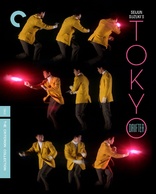
Movie rating
7.3 | / 10 |
Blu-ray rating
| Users | 4.0 | |
| Reviewer | 4.0 | |
| Overall | 4.0 |
Overview
Tokyo Drifter (1966)
Reformed killer Tetsu's attempt to go straight is thwarted when his former cohorts call him back to Tokyo to help battle a rival gang.
Starring: Tetsuya Watari, Chieko Matsubara, Hideaki Nitani, Ryûji Kita, Tsuyoshi YoshidaDirector: Seijun Suzuki
| Foreign | Uncertain |
| Drama | Uncertain |
| Surreal | Uncertain |
| Crime | Uncertain |
| Action | Uncertain |
Specifications
Video
Video codec: MPEG-4 AVC
Video resolution: 1080p
Aspect ratio: 2.35:1
Original aspect ratio: 2.35:1
Audio
Japanese: LPCM Mono
Subtitles
English
Discs
50GB Blu-ray Disc
Single disc (1 BD)
Playback
Region A (locked)
Review
Rating summary
| Movie | 4.0 | |
| Video | 4.5 | |
| Audio | 4.0 | |
| Extras | 3.0 | |
| Overall | 4.0 |
Tokyo Drifter Blu-ray Movie Review
Reviewed by Dr. Svet Atanasov November 25, 2011Japanese director Seijun Suzuki's "Tôkyô nagaremono" a.k.a. "Tokyo Drifter" (1966) arrives on Blu-ray courtesy of Criterion. The supplemental features on the disc include the film's original theatrical trailer; new and exclusive video interview with director Seijun Suzuki and assistant director Masami Kuzuu; and a video interview with director Seijun Suzuki recorded during a retrospective of his work by the Japan Foundation and Los Angeles Filmforum. The disc also arrives with an illustrated booklet featuring an essay by film critic Howard Hampton. In Japanese, with optional English subtitles for the main feature. Region-A "locked".
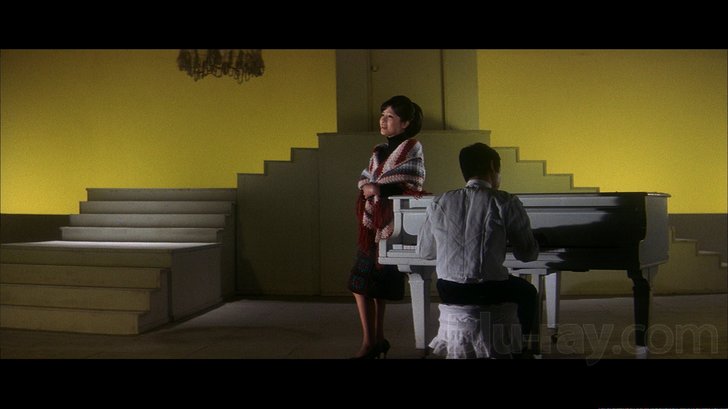
Tokyo jazz
While trying to go straight, former yakuza Tetsu (Tetsuya Watari, The Cleanup, The Outlaw Sword) a.k.a. Phoenix and his boss Kurata (Ryûji Kita, An Autumn Afternoon) get in trouble with a powerful gang eyeing their office building. When Kurata attempts to pay off the mortgage, he is attacked, and an innocent girl killed. To protect his boss, whom he regards as a father, Tetsu decides to claim responsibility. At first Kurata does not approve but eventually gives Tetsu his blessing and he becomes a “drifter”.
While wondering through the countryside, Tetsu is invited to join a gang. His reputation is so good that the leaders of the gang are convinced that once he joins them their enemies would have no other option but leave the area. But Tetsu rejects the invitation, insisting that he is still Kurata’s right-hand man. Eventually, he is tracked down by a group of assassins from Tokyo who try to kill him. However, instead of running away, Tetsu heads back to Tokyo to deal with their bosses.
Seijun Suzuki’s Tokyo Drifter is a strange hybrid of a film. It boasts the same trippy atmosphere and offbeat humor some of Lucio Fulci’s early films do, most notably Una sull'altra a.k.a. Perversion Story and The Maniacs, and over-the-top bizarre action that Kazuhiko Yamaguchi’s Wandering Ginza Butterfly and Wandering Ginza Butterfly 2: She-Cat Gambler are known for. Like Fulci and Yamaguchi’s films, Suzuki’s film also has a plot that is so chaotic and inconsistent that eventually it actually becomes entertaining.
Tokyo Drifter created a lot of problems for Suzuki. His bosses at Nikkatsu had asked him to deliver a "serious" film, but he surprised them with a psychedelic extravaganza that had them scratching their heads - and it is easy to understand why. The film’s lush trippy colors, odd humor and unusual framing are absolutely impossible to associate with "serious" Japanese cinema.
The main protagonist, Tetsu, is also one of the strangest killers to ever appear in a yakuza film. He dresses like a pimp - most of the time he wears a bright blue suit, has white shoes on, and a pair of thick black glasses - and, when things heat up around him, loves to sing. The man also kills his enemies with - without a shadow of a doubt - a plastic gun.
All this kitsch, however, really is quite entertaining. The film has a Texas-size heart and never even remotely takes itself seriously, which is why even the most bizarre sequences in it, such as the giant Western-style melee, actually make sense. After all, with these types of films style is everything, and in Tokyo Drifter there is clearly more than enough to make up for the lack of substance.
Technically, the film is definitely impressive. From the oversaturated black and white prologue to the strange overhead shots to the minimalistic designs at the end, the film constantly tries to surprise, and more often than not it certainly does. The editing is also wild but, again, rather appropriate.
Shigeyoshi Mine’s (the original Japanese film Cobra) pulpy jazz soundtrack is excellent. The theme song, in particular, rivals some of the very best songs recorded by Meiko Kaji.
Note: After the shock effect Tokyo Drifter had amongst Nikkatsu studio heads, Suzuki was forced to shoot only in black and white. He made two more films for the Japanese studio, Fighting Elegy and Branded to Kill, before he was fired.
Tokyo Drifter Blu-ray Movie, Video Quality 
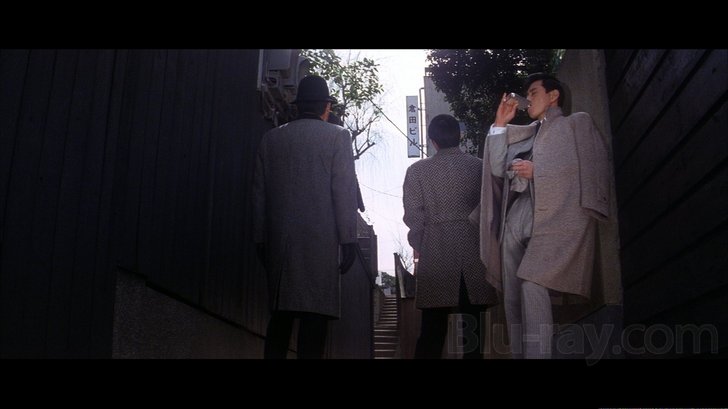
Presented in its original aspect ratio of 2.35:1, encoded with MPEG-4 AVC and granted a 1080p transfer, Seijun Suzuki's Tokyo Drifter arrives on Blu-ray courtesy of Criterion.
The following text appears inside the booklet provided with this Blu-ray disc:
"This new high-definition digital transfer was created on a Spirit Datacine from a 35mm low-contrast print. Thousands of instances of dirt, debris, scratches, splices, warps, jitter, and flicker were manually removed using MTI's DRS and Pixel Farm's PFClean, while Image System's DVNR was used for small dirt, grain, and noise reduction.
Telecine supervisor: Lee Kline.
Telecine colorost: Joe Gawler/Technicolor, New York."
Anyone who has seen Tokyo Drifter only via Criterion's old non-anamorphic DVD release will be enormously impressed with its transition to Blu-ray. The film looks beautiful, boasting colors that I suspect will inspire a lot of people to begin researching Suzuki's early films.
Contrary to what has been said, the contrasty and oversaturated black and white prologue looks exactly as it should (and it is explained why by director Suzuki in one of the supplemental features on the disc). The rest of the film also looks very strong. When projected the image conveys substantial depth and very pleasing fluidity, while overall contrast levels, as wild as they may seem at times, are well balanced. What impresses the most, however, is the excellent color-scheme. The ambient reds, yellows, blues, and greens look fantastic (though our screencaptures do not fully convey how good they are, the trippy bar scenes truly look like psychedelic dreams). Detail is also dramatically improved, especially during close-ups, where various textures are now extremely easy to see. Some noise corrections have been performed, but film grain is very much intact and quite easy to see. Finally, the newly restored high-definition transfer is free of large cuts, damage marks, stains and warps. All in all, Criterion's presentation of Tokyo Drifter is competent and enormously pleasing. (Note: This is a Region-A "locked" Blu-ray disc. Therefore, you must have a native Region-A or Region-Free PS3 or SA in order to access its content).
Tokyo Drifter Blu-ray Movie, Audio Quality 
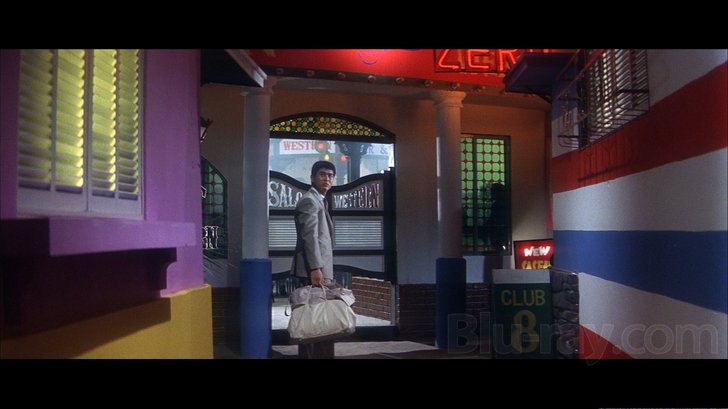
There is only one audio track on this Blu-ray disc: Japanese LPCM 1.0. For the record, Criterion have provided optional English subtitles for the main feature. When turned on, they appear inside the image frame.
The following text appears inside the booklet provided with this Blu-ray disc:
"The monaural soundtrack was remastered at 24-bit from the original soundtrack print. Clicks, thumps, hiss, and hum were manually removed using Pro Tools HD. Crackle was attenuated using AudioCube's integrated workstation."
The audio has decent depth and fluidity. Shigeyoshi Mine's unique score, in particular, gets a nice boost. The dialog is also stable and crisp. Occasionally, however, some extremely light hiss sneaks in. It is never distracting but its presence is felt. For the record, there are no sync issues, pops, or audio dropouts to report in this review. The English translation is very good.
Tokyo Drifter Blu-ray Movie, Special Features and Extras 
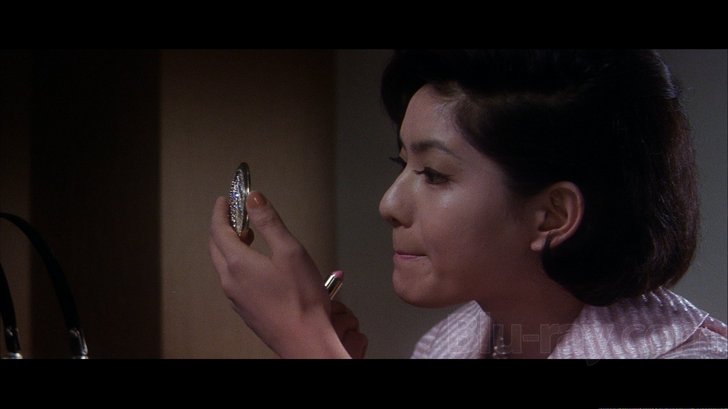
- Trailer - an original theatrical trailer for Tokyo Drifter. In Japanese, with optional English subtitles. (3 min, 1080i).
- Seijun Suzuki and Masami Kuzuu - in this new interview, director Seijun Suzuki and assistant director Masami Kuzuu discuss the production history of Tokyo Drifter. The interview was recorded exclusively for Criterion in July 2011. In Japanese, with optional English subtitles. (13 min, 1080i).
- Seijun Suzuki - this interview with director Seijun Suzuki was recorded during a retrospective of his work by the Japan Foundation and Los Angeles Filmforum at the Nuart Theatre in Los Angeles in March 1997. The Japanese director discusses his difficult relationship with Nikkatsu, body of work, and the state of contemporary Japanese cinema. In Japanese, with imposed English subtitles. (21 min, 1080i).
- Booklet - an illustrated booklet featuring an essay by film critic Howard Hampton.
Tokyo Drifter Blu-ray Movie, Overall Score and Recommendation 
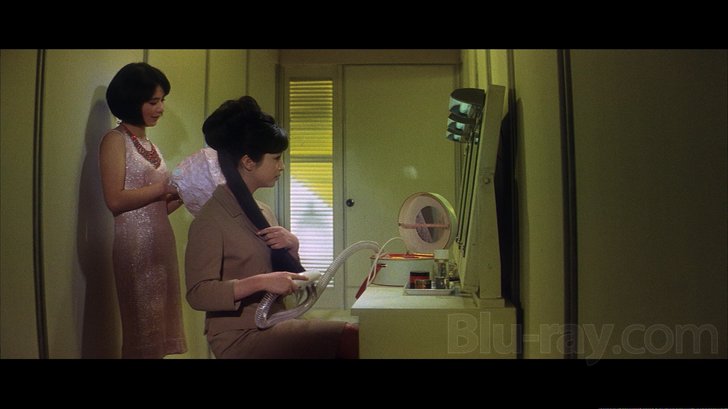
Seijun Suzuki's Tokyo Drifter is one-of-a-kind psychedelic extravaganza in which style definitely outranks substance. But the film has a Texas-size heart and never even remotely takes itself seriously, which is why even the most bizarre sequences in it make sense. It is a beautiful and deliriously poetic film that should not be missed. As expected, Criterion's presentation of the film is competent and enormously pleasing. HIGHLY RECOMMENDED.
Similar titles
Similar titles you might also like

Branded to Kill
殺しの烙印 / Koroshi no rakuin
1967

Violent Cop
その男、凶暴につき
1989

Dragnet Girl
非常線の女
1933

Fighting Elegy
けんかえれじい / Kenka erejî
1966

Ley Lines
1999

Proxy War
Battles Without Honor and Humanity
1973

Outrage
アウトレイジ / Way of the Yakuza
2010

Battles Without Honor and Humanity
1973

Yi Yi
2000

Pale Flower
乾いた花 / Kawaita hana
1964

Three Outlaw Samurai
三匹の侍 / Sanbiki no samurai
1964

Late Spring
晩春 | 4K Restoration
1949

Yojimbo
用心棒 / Yôjinbô
1961

High and Low 4K
天国と地獄 / Tengoku to jigoku
1963

A Bittersweet Life
2005

The Life of Oharu
西鶴一代女 / Saikaku ichidai onna
1952

Elite Squad: The Enemy Within
Tropa de Elite 2: O Inimigo Agora É Outro
2010

An Autumn Afternoon
秋刀魚の味 / Sanma no aji
1962

Infernal Affairs II
無間道II
2003

Shoplifters
万引き家族 / Manbiki kazoku
2018